Headlines
Real Madrid Punish Wasteful Dortmund to Secure 15th Champions League Title
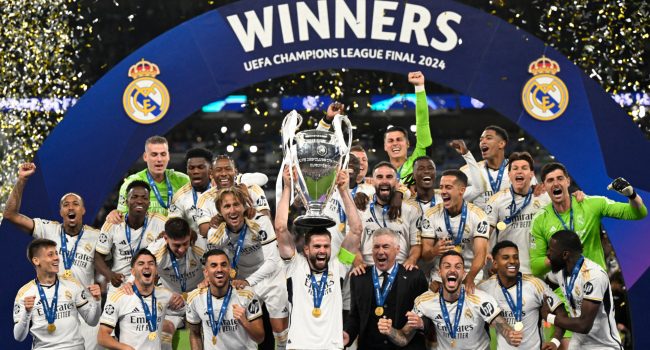
Real Madrid clinched their 15th Champions League title by defeating Borussia Dortmund 2-0 at Wembley. Carvajal scored from Kroos’ corner in the 74th minute, followed by Vinicius’ goal. Madrid has now won the European Cup nine times in a row and six times in the last 11 seasons. Dortmund missed key chances in the first half, hitting the post and failing to convert one-on-one opportunities.
Despite relying on some luck, Madrid continues to excel in Europe’s elite competition. Carvajal, Kroos, Nacho, and Modric made history by winning the European Cup six times, joining Real legend Paco Gento. Ancelotti also secured his fifth title as the most successful coach in the competition’s history.
The match at Wembley saw some security concerns with pitch invaders, despite the presence of over 2,500 stewards. Madrid’s ability to consistently triumph in the Champions League was emphasized by Ancelotti, Nacho, and Modric before the game.
The Spanish champions managed to turn their luck around in the second half after a shaky start in the first period.
Gregor Kobel was put to the test on 48 minutes by Kroos, who almost scored a memorable free-kick in his final game for the club.
Bellingham rose to stardom during his time at Dortmund before moving to Madrid for a hefty fee of over 100 million euros ($108 million) a year ago.
The England international came close to scoring against his former team with Vinicius’ cross, but couldn’t quite make the decisive touch.
Madrid secured the victory with a goal from Carvajal off Kroos’ corner 16 minutes before the final whistle.
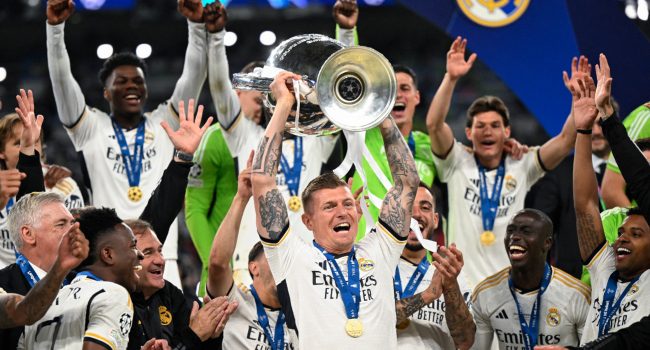
Real Madrid’s German midfielder #08 Toni Kroos (C) and Real Madrid’s players lift the trophy to celebrate their victory at the end of the UEFA Champions League final football match between Borussia Dortmund and Real Madrid, at Wembley stadium, in London, on June 1, 2024. (Photo by INA FASSBENDER / AFP)
Kobel made some crucial saves against Camavinga and Nacho, while Bellingham’s shot was deflected behind by Schlotterbeck.
Despite Kobel’s efforts, Bellingham had a memorable moment as his pass set up Vinicius for the final blow against Dortmund.
Real Madrid showcased their legendary European pedigree by defeating Borussia Dortmund to secure their 15th Champions League title. In a match that highlighted their clinical finishing and tactical acumen, Madrid punished a wasteful Dortmund side to claim a historic victory.
Match Build-Up
Pre-Match Expectations
The anticipation was palpable as two of Europe’s elite clubs prepared to clash in the Champions League final. Real Madrid, with their rich history in the competition, were slight favorites. However, Dortmund, known for their attacking prowess, were seen as capable of causing an upset.
Team Form and Key Players
Both teams entered the final in excellent form. Real Madrid’s frontline, led by Karim Benzema, was firing on all cylinders. Dortmund’s hopes rested heavily on the young shoulders of Erling Haaland, who had been in scintillating form throughout the tournament.
First Half Analysis
Initial Strategies and Setups
The match kicked off with both teams opting for aggressive tactics. Real Madrid pressed high, aiming to disrupt Dortmund’s buildup play. Dortmund, on the other hand, looked to utilize their pace on the counterattack.
Key Moments and Turning Points
The first half was a rollercoaster, with both teams creating numerous chances. However, it was Madrid’s experience and composure that began to show as they managed to absorb Dortmund’s pressure and launch counterattacks.
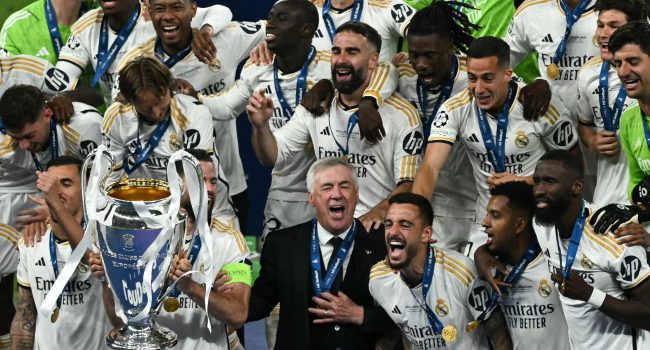
Real Madrid’s Italian coach Carlo Ancelotti and his players celebrate with the trophy after the UEFA Champions League final football match between Borussia Dortmund and Real Madrid, at Wembley stadium, in London, on June 1, 2024. (Photo by Ben Stansall / AFP)
Dortmund’s Missed Opportunities
Highlighting Missed Chances
Dortmund had several clear-cut opportunities to take the lead. Haaland and Marco Reus both had chances that went begging, as the German side struggled to convert their dominance into goals.
Impact on the Game’s Momentum
These missed opportunities allowed Real Madrid to grow into the game. Each miss seemed to bolster Madrid’s confidence while frustrating Dortmund, disrupting their rhythm and focus.
Real Madrid’s Dominance
Tactical Adjustments
Carlo Ancelotti’s tactical adjustments proved decisive. By switching to a more compact midfield, Madrid nullified Dortmund’s attacking threats and began to control the game’s tempo.
Key Performances
Karim Benzema was instrumental, leading the line with poise and precision. Luka Modrić and Toni Kroos controlled the midfield, dictating play and creating numerous chances.
Second Half Breakdown
Goals and Crucial Plays
The second half saw Real Madrid turn their dominance into goals. Benzema opened the scoring with a well-placed header, and Vinícius Júnior doubled the lead with a sublime solo effort. Dortmund pulled one back through Haaland, but Madrid quickly restored their two-goal cushion through a thunderous strike from Federico Valverde.
Substitutions and Their Effects
Ancelotti’s substitutions, including the introduction of Rodrygo and Eduardo Camavinga, added fresh energy and solidified Madrid’s control. Dortmund’s attempts to change the game with substitutions fell flat, as they struggled to break down Madrid’s resolute defense.
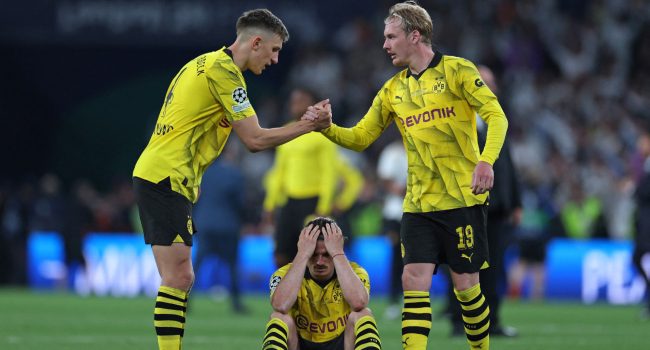
(From L) Dortmund’s German defender #04 Nico Schlotterbeck, Dortmund’s Austrian midfielder #20 Marcel Sabitzer, and Dortmund’s German midfielder #19 Julian Brandt react after loosing at the end of the UEFA Champions League final football match between Borussia Dortmund and Real Madrid, at Wembley stadium, in London, on June 1, 2024. (Photo by Adrian DENNIS / AFP)
Player Highlights
Standout Performances from Real Madrid
Karim Benzema was the star of the show, not only scoring but also assisting and leading by example. Vinícius Júnior’s pace and trickery were a constant threat, while Modrić and Kroos provided the creative spark.
READ ALSO: Dortmund Dream of Upsetting Real Madrid in Champions League Final
Notable Efforts from Dortmund
Despite the loss, Erling Haaland and Jude Bellingham stood out for Dortmund. Haaland’s goal was a testament to his quality, and Bellingham’s relentless work rate and vision kept Dortmund in the fight.
Tactical Masterclass
Analysis of Ancelotti’s Tactics
Ancelotti’s game plan was a masterclass in tactical flexibility. By tightening the midfield and exploiting Dortmund’s defensive vulnerabilities, he ensured that Madrid controlled the crucial phases of the game.
How Real Madrid Exploited Dortmund’s Weaknesses
Real Madrid exploited Dortmund’s high defensive line with quick, incisive passes. Benzema’s intelligent movement created space, and Vinícius’ speed proved too much for Dortmund’s defenders to handle.
Post-Match Reactions
Player Interviews
Benzema, in his post-match interview, praised the team’s collective effort and highlighted their determination to win. Dortmund’s Haaland expressed disappointment but remained optimistic about the future.
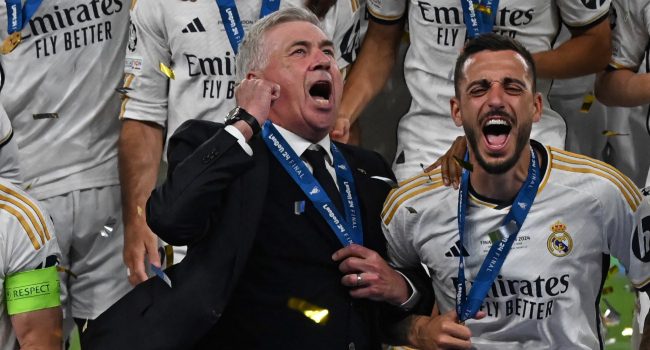
Real Madrid’s Italian coach Carlo Ancelotti (C) celebrates with his medal after winning the UEFA Champions League final football match between Borussia Dortmund and Real Madrid, at Wembley Stadium, in London, on June 1, 2024. (Photo by Paul ELLIS / AFP)
Coach Comments
Ancelotti credited his players for their resilience and tactical discipline. Dortmund’s coach admitted that missed chances and defensive lapses cost them dearly.
Fan Celebrations
Reactions from Madrid Fans
Real Madrid fans celebrated jubilantly, both in the stadium and across the globe. The victory cemented their team’s status as Europe’s most successful club.
Dortmund Supporters’ Response
Dortmund supporters, while disappointed, applauded their team’s effort and remained hopeful for future successes.
Statistics Overview
Key Match Statistics
- Possession: Real Madrid 55% – 45% Dortmund
- Shots on Target: Real Madrid 7 – 4 Dortmund
- Corners: Real Madrid 6 – 3 Dortmund
- Fouls: Real Madrid 12 – 15 Dortmund
Individual Player Stats
- Karim Benzema: 1 goal, 1 assist
- Vinícius Júnior: 1 goal, 3 key passes
- Erling Haaland: 1 goal, 4 shots
Historical Context
Real Madrid’s Champions League Legacy
This victory marks Real Madrid’s 15th Champions League title, extending their record as the most successful club in the competition’s history. Their consistent excellence in Europe is unmatched.
Comparison with Previous Finals
Compared to previous finals, this win was a showcase of Madrid’s tactical evolution and ability to perform under pressure. It stands out as a testament to their enduring legacy in European football.
Impact on European Football
Implications for Next Season
Real Madrid’s triumph will boost their confidence heading into the next season. For Dortmund, the experience will serve as a valuable lesson as they aim to challenge for the title again.
Broader Effects on European Football
The victory reinforces the dominance of Spanish clubs in European competitions and highlights the competitive nature of the Champions League, where elite clubs continuously push the boundaries of excellence.
Media Coverage
Headlines and Coverage from Major Sports Outlets
Major sports outlets hailed Real Madrid’s performance, with headlines emphasizing their clinical finishing and tactical superiority. The match was widely covered, with detailed analysis and player ratings.
Social Media Reactions
Social media buzzed with reactions from fans, pundits, and players. Hashtags related to the match trended globally, showcasing the widespread interest and emotional investment in the outcome.
Conclusion
Real Madrid’s victory over Borussia Dortmund to secure their 15th Champions League title was a masterclass in tactical discipline and clinical finishing. While Dortmund rued their missed opportunities, Madrid’s experience and composure shone through, underscoring their status as Europe’s premier football club.
FAQs
How did Real Madrid win the match?
Real Madrid won by capitalizing on their chances and executing a well-thought-out tactical plan, punishing Dortmund for their missed opportunities.
Who were the standout players?
Karim Benzema, Vinícius Júnior, Luka Modrić, and Toni Kroos were standout performers for Real Madrid. Erling Haaland and Jude Bellingham were notable for Dortmund.
What were the key moments of the game?
Key moments included Benzema’s opening goal, Vinícius Júnior’s solo effort, and Federico Valverde’s thunderous strike that sealed the win for Madrid.
How many Champions League titles has Real Madrid won?
With this victory, Real Madrid has now won 15 Champions League titles, extending their record as the most successful club in the competition’s history.
What’s next for both teams?
Real Madrid will look to build on this success and continue their dominance in Europe. Dortmund will analyze their performance and aim to come back stronger in the next season, learning from this experience.
